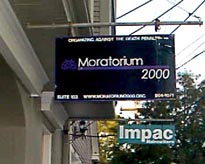You’ve seen them around campus in purple armbands and at tables in the Danna Center. Perhaps you even know a few of them. Students with The Moratorium Campaign are becoming a visible presence on Loyola’s campus, and they’ve gotten more vocal about their cause.
So what is their cause?
The Moratorium Campaign was begun by Sister Helen Prejean, CSJ, a Louisiana native, who worked with death row inmates guilty of capital crimes. Her work with three men on Angola’s death row is the basis for her book “Dead Man Walking,” which inspired the 1995 movie of the same name. In her book, Prejean wrote how she soon became convinced that the death penalty is wrong, and that it is applied unfairly in the United States.
The Moratorium Campaign, part of a larger and growing movement across the United States, seeks an immediate stay on executions.
According to the Touro Law Center websie, the campaign is not about getting convicted killers off the hook. It is composed of people for and against the death penalty who seek to make changes within the system. Jeff Guhin, sociology senior, who has been working with the campaign, says “life without parole” is the alternative.
“We can’t remove vengeance and human error from the system,” says Teresa Meisz, Outreach Director of the Moratorium Campaign in New Orleans.
According to the Death Penalty Information Center, there is a great deal of evidence, racial and economic, to suggest that the death penalty is ineffective and being applied unfairly. A capital sentence is twenty-two times more likely to be given to an African-American convicted of killing a white than a white killing an African-American. At least 23 people proven innocent post mortem have been executed in the United States in the 20th century. More than 100 defendants have been released from death row since 1976 after spending years there for crimes they did not commit. The death penalty, on average, costs more than double the amount to keep a person in prison for the rest of his natural life.
A 1996 survey by Cooley Law School found that in Louisiana alone, for every five people executed since 1976, one person has been released from death row. Another study from Columbia Law School in 2000 found that from 1973 to 1975, 64 percent of all capital cases in Louisiana were overturned due to basic systematic error such as ineffective counsel and prosecutorial misconduct.
The United States is the only industrialized nation in the world to impose capital punishment and, according to the Death Penalty Information Center and Human Rights Watch respectively, currently leads the world in executions of minors and the mentally retarded.
LUCAP has gotten involved in the Moratorium Campaign this year to raise awareness of the problems with capital punishment. Students such as Guhin and Allison Drevich, sociology senior, have been working to get the movement going on campus.
“We wear a purple armband every day there’s an execution,” Drevich said, “in hopes of raising awareness on campus.”
In addition, on those days, a table will be set up in the Danna Center with information and statistics on the death penalty.
When asked why she wanted to end capital punishment completely, Drevich replied: “I’m against the death penalty because of my faith and my conviction that the death penalty is [morally] wrong. All of the facts just reinforce my beliefs. . . Two wrongs don’t make a right. . . I don’t feel it’s the job of the United States, or any government, to act like God.”
Drevich’s convictions are supported by the Catholic Church, which forbids capital punishment, except in cases of grave danger where the person poses a threat to the community and there is no viable alternative such as prison. In his 2001 encyclical Evangelium Vitae, Pope John Paul II writes that governments “ought not to go to the extreme of executing the offender except in cases of absolute necessity: In other words, when it would not be possible otherwise to defend society. Today, however, as a result of steady improvements in the. . . penal system, such cases are. . . practically non-existent.”
“The Moratorium Campaign is about getting a regulated, non-partisan body to examine the problems with the law and change, not abolish it,” says Guhin.
This was done in Illinois in 2000 when Republican Governor George Ryan put a stay on executions until a self-appointed bi-partisan group could determine any faults with the system. The group found more than one hundred faults. Many within the group suggested an abolition of the death penalty. Redress for the problems is still stalled in the state legislature, however.
That just goes to show, explains Meisz, that money, not justice, motivates the system. “We can’t have a system that determines life and death in the same way they decide to fill potholes on St. Charles Avenue.”
Guhin says the Loyola community has been very receptive to the Moratorium Campaign. Besides the armbands, students are engaged in activism and service, and will soon begin senatorial visits and a letter writing campaign.
“I want to encourage everyone to get to know more about the death penalty, because, once you know the facts, it’s difficult to support.”






